#the theogony
Text
This has been bouncing around in my head for a year now and I need to share it before it drives me actually insane (which, given the subject matter, is entirely appropriate)
In the Overly Sarcastic Productions video for The Theogony, they mention that Metis was prophesied to bear thoughtful children greater than their father—first a daughter, then a son. Zeus proceeds to avert this prophecy by eating her, yet Athena is born from his body anyway.
Now the thing is, nowhere else in the surviving Greek mythos is it possible to avert a prophecy. It just doesn’t happen. The path you take to avoid it frequently leads to the prophecy being fulfilled.
Then, in their video for Dionysus, it’s mentioned that in some versions of the myth, Zagreus/Dionysus (not just the god of parties—he was also the god of madness, divine inspiration, and rebirth from death) was supposed to be Zeus’ successor. And Dionysus is the only other god to be born from Zeus’ body instead of from a mother. Just like the daughter of Zeus and Metis was.
Greek mythology/religion has no established canon, especially since it evolved organically, and the chances of these two myths connecting to each other is slim to none. And yet I can’t help noticing the similarities in the myths and how they fill each other’s holes. Can’t help conflating them.
So: I want a story where Dionysus isn’t just the son of Zeus and the mortal Semele, but also—because of getting sewn into his father’s body—the son of Metis as well. And therefore, because he is the firstborn son of Zeus’ first wife—and also Zeus’ youngest son, following the Ouranos-Kronos-Zeus “youngest child succeeds” pattern—the true heir of the Olympian throne.
Make it happen, Riordan. You know you want to.
#overly sarcastic productions#Greek myths#Greek mythology#classical mythology#dionysus#the theogony#Athena#Zeus#metis#semele#Zagreus#original content#Percy Jackson#percy jackon and the olympians#rick riordan
801 notes
·
View notes
Text
For how often one hears about Zeus's seven marriages in Hesiod's Theogony, it's worth noting that Hesiod actually only calls two of those seven goddesses wives, probably suggests marriage for a third, but gives not the slightest indication that the other four unions were marriages. Let's take a look at the text.
"Zeus as king of the gods made Metis his first wife (alochos), wisest among gods and mortal men".
"Second he married sleek Themis, who bore the watchers, Lawfulness, Justice, and flourishing Peace … and the Fates, to whom Zeus the resourceful gave the most privilege" The word Hesiod actually uses is "ἠγάγετο" = lead, carry, fetch, bring. So no explicit mention to marriage is made, though it makes sense to interpret it as such, as Zeus leading Themis to Olympos in the way a wife is supposed to be brought home. In the only instance of someone taking a spouse before the regime of Zeus in the Theogony, Perses is said to have brought/led (ἠγάγετ᾽) Asteria "to his great house to be called his dear wife (akoitis)", so the same word used in reference to Zeus and Themis here explicitly refers to marriage earlier in the text.
"Eurynome, a daughter of Oceanus with lovely looks, bore him the three Graces, Aglaia, Euphrosyne, and fair Thalia." No indication of marriage here.
"And he came to the bed of Demeter abundant in nourishment, and she bore the white-armed Persephone." No mention of marriage here either, and possibly meaningful that Zeus is the one who goes to her bed rather than vice versa. Well, not actually meaningful, but it sure doesn't sound like a marital or long-term relationship.
"Again, he took love of Memory with her lovely hair, from whom the Muses with their golden diadems were born, nine of them…" + "[the Muses] were born in Pieria to Memory, queen of the foothills of Eleutherae, in union with the father, the son of Kronos; … Nine nights Zeus the resourceful lay with her, going up to her holy bed far away from the immortals." So Zeus loved (ἐράσσατο) Mnemosyne, and visited her, to her own home and apart from the other gods, for nine nights. No part of this indicates a marriage.
"Leto gave birth to Apollo and Artemis the archer, lovely children above all the celestials, in shared intimacy with Zeus who bears the aegis." Again, no mention of marriage. Similar language is used to describe Zeus's sexual unions with Semele and Alkmene.
"Last of all he made Hera his fertile wife (akoitis), and she bore Hebe and Ares and Eileithyia, sharing intimacy with the king of gods and men." The language used to describe the sexual union is the same, except that Hera is also made a wife.
Is it possible to interpret all of these unions as marriages? Certainly, but that's just not something Hesiod actually claims. It is just as possible to only consider Metis, Themis and Hera as actual wives, or even just Metis and Hera, though personally I'd consider all three. Notice, too, that only these three have their positions on the list specified and clearly identified: first, second and last.
25 notes
·
View notes
Text
My Greek mythology professor was talking about how yes, giving offerings and sacrifices is worship to the gods, but reading Hesiods poetry was a way to worship and connect to them as well.
So even if you can’t give physical offerings you can at least read about the gods as a way of worship
592 notes
·
View notes
Text

this line is so raw you’d think it was from tumblr but actually it is from M.L. West’s commentary on hesiod
#tagamemnon#theogony#my caption is dumb but the point is that’s a beautiful way to say the muses sing while they walk
1K notes
·
View notes
Text

"Fair wreathed Kytherea"
-Hesiod's Theogony, Gany translation
Aphrodite of the golden crown
The lustrous hand mirror
Seafoam from the cosmos rains down
The mist grows clearer
Kytherea blew in
From warm Cyprus winds
Enchanting the Seamen and Seafarers
I hope you enjoyed today's tale of legend and lore, come back next week and there will be even more
#aphrodite art#aphrodite devotion#aphrodite goddess#seafoam#hand mirror#venus#cyprus#greek gods#hesiod#theogony#the og#most beautiful woman in the world#original poets on tumblr#writeblr#artblr#beauty#goddess of love#take me to your planet take me to your venus
193 notes
·
View notes
Photo
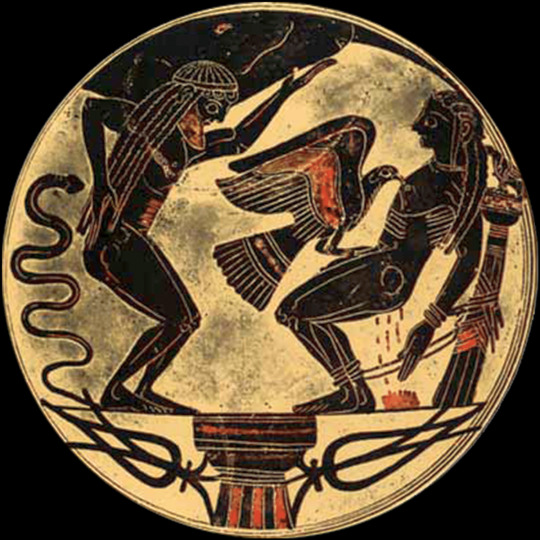
Prometheus
In Greek mythology, the Titan Prometheus had a reputation as being something of a clever trickster and he famously gave the human race the gift of fire and the skill of metalwork, an action for which he was punished by Zeus, who ensured everyday that an eagle ate the liver of the Titan as he was helplessly chained to a rock.
Continue reading...
258 notes
·
View notes
Text
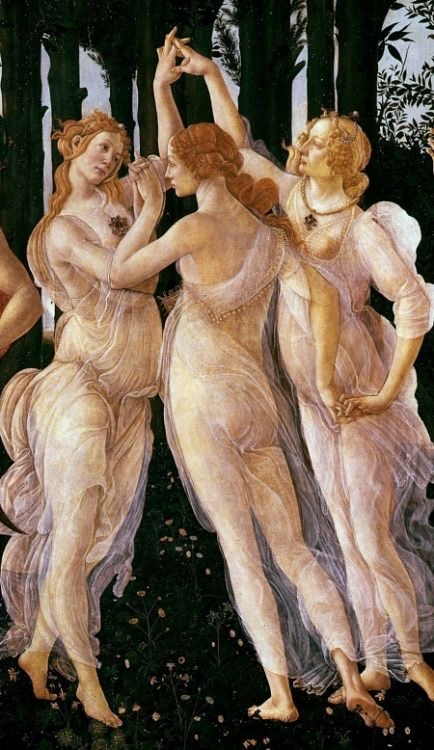
‘three fair-cheeked Kharites…from whose eyes as they glanced flowed love that unnerves the limbs’
- hesiod, theogony
The Three Graces - detail from La Primavera, Sandro Botticelli (Uffizi Gallery, Firenze)
#dark academia#dark acadamia aesthetic#poetry#art#beauty#words#light academia#mine#photos from pinterest#botticelli#greek myth#greek mythology#renaissance art#italian renaissance#italian art#hesiod#theogony#book quotes
362 notes
·
View notes
Text



Chapter 11: Ekleipsis | Epilogue: Philomel
read now on ao3 | start from the prologue
the end :)
74 notes
·
View notes
Text
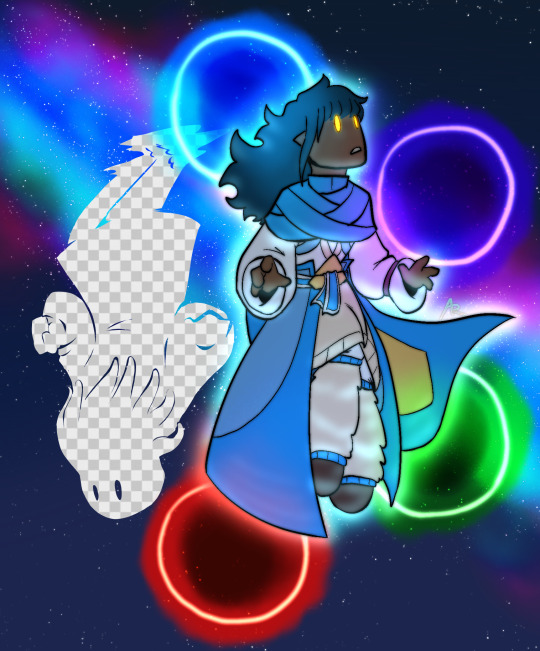
I'm searching for, searching for you everywhere
I can see you in most everything
I'm searching for, searching for you everywhere
But somehow you can't stop transforming
#w101#w101 fandom#wizard101#wizard101 fandom#w101 oc#wizard101 oc#dasein#wizsein#sal art#oc: aedan#(wakes up) oh fuck i have to post wizsein (runs into traffic)#lyrics are from world.search(you); by mili which is kind of a goofy song but also oghhhhhhhhhhhh#i like this chibi style........nice break from my cartoon realism i usually do#smoothed them.#also the transparency pattern for dasein is vaguely inspired by the way Overly Sarcastic Productions drew Khaos in their theogony video lol#'vague entity representing some kind of primordial emptiness pre-anything happening' ohhhhh okay.#hes a space where there should be something. you know#will i ever draw a background that isnt space? No.#i hate backgrounds but stars are easy
83 notes
·
View notes
Text
For even now, when someone of mortals living on earth
Seeks favor, duly performing comely sacrifices,
He calls on Hecate; and great honor follows him
Quite easily—him, that is, whose prayers the goddess readily
Receives; and she grants him wealth, since this power is hers.
καὶ γὰρ νῦν, ὅτε πού τις ἐπιχθονίων ἀνθρώπων
ἔρδων ἱερὰ καλὰ κατὰ νόμον ἱλάσκηται,
κικλῄσκει Ἑκάτην. πολλή τέ οἱ ἕσπετο τιμὴ
ῥεῖα μάλ᾽, ᾧ πρόφρων γε θεὰ ὑποδέξεται εὐχάς,
καί τέ οἱ ὄλβον ὀπάζει, ἐπεὶ δύναμίς γε πάρεστιν.
-Hesiod, Theogony 416-420
#classics#tagamemnon#Greek#Greek language#Ancient Greek#Ancient Greek language#translation#Greek translation#Ancient Greek translation#poem#poetry#poetry in translation#Hesiod#Theogony#Greek religion#Ancient Greek religion#Hellenic polytheism#Hecate#Hekate#dactylic hexameter
136 notes
·
View notes
Text
Children of Zeus in the Homeric Hymns. Generational Succession by Nancy Felson
#homeric hymns#hesiod#the theogony#succession myth#zeus#athena#apollon#apollo#gaia#hera#typhon#article
14 notes
·
View notes
Text
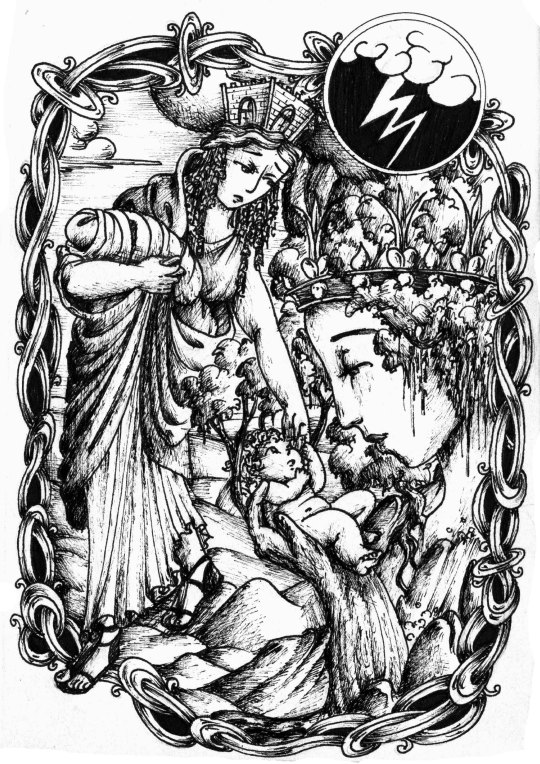
Rhea leaving baby Zeus in Gaia's care.
#Rhea#Gaia#Zeus#greek mythology#myth#mythology#greek goddess#greek god#theoi#theogony#mother of the gods#earth goddess#god of thunder#mother#child#baby#family#pen and ink#drawing#illusrtation#art#artists on tumblr
73 notes
·
View notes
Text
hi just hopping on to start that @clare-with-no-i is a genius and theogony is a masterpiece that I will never get over !!!!!!!
24 notes
·
View notes
Text
I really fuck with the idea that Kronos does feel guilt and shame for eating his children, bc not only does it make him a more layered character, it actually makes him an even more menacing and disturbing antagonist. Bc even tho he knows he breaks Rhea’s heart over and over, even tho he knows he robs his children of their childhood and condemns them to long years of pain, even tho he dearly loves his wife and would’ve loved his children just as deeply if he raised them, he still loves power even more and his love for his wife and children will never come first.
#like less Kronos feeling apathetic about eating his kids pls#greek mythology#greek pantheon#ancient greek mythology#kronos#cronos#Kronos Greek mythology#rhea titan#rhea goddess#rhea#Rhea Greek mythology#greek goddess#greek myths#greek gods#theogony
22 notes
·
View notes
Note
All the basics of Greek myth
The gods/godesses their roles,ther relationship etc etc
Okay. So first of all we all know about the 12 Olympians, i.e., Zeus, Hera, Poseidon, Demeter, Artemis, Apollo, Ares, Athena, Aphrodite, Hermes. Hephaestus and either Hestia or Dionysus, plus Hades.
Now before these Olympians there were the Titans, which included Kronos, Rhea, Oceanus, Coeus, Japetos, Crius, Hyperion, Theia, Themis, Tethys, Phoebe, and Mnemosyne, all of whom came from the Primordials, Ouranos and Gaia.
Along with them the other primordial gods included Khaos, Tartarus, Erebus, Eros, Nyx, Aether, Hemera, Pontus and Ourea.
Now this is an extremely brief explanation of these three generations of deities. I’mma get into a little more detail into their relations by whipping out Hesiod’s Theogony/the Greek Creation Myth (cuz his version is considered the standard creation myth for this pantheon till date), which sums about everything up pretty well actually so… Kudos to our fellar.
So according to this myth, in the very beginning, there was only chaos, from which we get the personified and deified version of it called Khaos. But soon after Gaia, Eros and Tartarus pop up, and then Khaos creates two more deities, namely Erebus and Nyx, who then, together, proceed to create Hemera and Aether, while Gaia creates Ouranos to partner up with, and they both, again together, whip out
The male titans, namely Kronos, Coeus, Japetus, Crius and Hyperion.
The female titans, namely Rhea, Themis, Tethys, Phoebe and Mnemosyne.
Three cyclopses, namely Brontes, Steropes and Arges.
Three Hekatonchieres (monstrous giants of immense strength and power, each having fifty heads and a hundred arms), namely Briareos, Kottos and Gyges.
Now all of these three sets of kids have one common thing, hating on Ouranos, for some reason that gets later uncovered. The reason is mostly him kidnapping his monstrous-looking kids and hiding them in secret places under the Earth (which, here, is Gaia).
Gaia got sick of this shit and produced a sickle out of adamant and asked her kids to teach Ouranos a lesson, but among these kids, only Kronos stood up to do it and so he did. Hid inside Gaia and when Ouranos came to lay with his wife, his lil kid popped up and castrated him, his two little thingies falling into the ocean, leading it to foam, and from that foam was born our beloved Aphrodite. Sensational. From his blood arose the Erinyes (chthonic goddesses of vengeance), the Giants and the Meliai (nymphs of the ash tree).
Now Kronos had full control over the cosmos from Ouranos, and was producing kids (i.e., Hestia, Poseidon, Demeter, Hera and Hades. Zeus wasn’t born yet) with Rhea. But his dad and Gaia had prophesized that one of his own kids would overthrow him, and from there we get the famous Kronos-swallowing-his-kids myth. And ofc, Zeus gets saved from the swallowing thingy with the help of his mom and grandparents, and then raised in seclusion in a cave below Mount Aigaion in the city of Lyktos of Crete. Also Kronos doesn’t know about this cuz Rhea wrapped up a huge stone in baby’s clothes and gave it to him saying it was the last kid, aka, Zeus.
(Chiron is also one of Kronos’s kids, and hence Zeus’s half-brother, paternally cuz Kronos once turned himself into a horse to mate with the Oceanid nymph, and one of the daughters of Oceanus and Tethys, Philyra, who mated with him in the usual human-nymph form, and hence we get him as a centaur.)
After Zeus grew up fully, he forced Kronos (Gaia did something to help with this, like give him some kinda poison secretly to make him puke his kids out-) to release his siblings. He then released the Cyclopses (who were still trapped with the Hekatonchieres btw), and then gave him his signature thunderbolt. This is when the great war called the Titanomachy happened between the Titans and Zeus and his siblings, over the control of the cosmos. This war went on for years, and in the 10th year, Zeus even released the Hekatoncheires, who also helped him overthrow the titans. Zeus threw his thunderbolt at the previous generation of gods, hence defeating them and throwing them into Tartarus, thus ending the war.
There was another threat to him tho, and it was Typhon, son of Gaia and Tartarus. But Zeus defeated him too and threw him into Tartarus as well.
Then my mans got elected as the king of gods (as he should), and had his first wife Metis. But after knowing that he had the same fate as Kronos, i.e., a son of Metis would overthrow him, he swallowed his wife (while she was pregnant with Athena, and hence later on we see Zeus HIMSELF giving birth to a fully-grown Athena from his mind) and that’s how he ended the cycle of succession. Smart move but I need justice for Metis >:<
Now for the new generation of Olympians, i.e., Artemis, Apollo, Ares, Hermes, Dionysus and Hephaestus (also let’s add Persephone too), here’s how it goes. (Athena and Aphrodite were already covered above)
Apollo and Artemis were twin kids of Zeus’s 6th wife, Leto, who was the daughter of Coeus and Phoebe.
Persephone was born from the union of Zeus and Demeter. (there are other versions to this myth too)
Dionysus was born from the union of Zeus and Semele (a mortal woman), but he was again stitched to Zeus’s thigh to save him from Hera, who was deadlocked in killing him (cuz ofc Zeus cheated on her with another woman), and later births Dio himself. (there are other versions to this myth as well. For example, another myth says he was born from the union of Zeus and Persephone.)
Hermes was born from the union of Zeus and Maia (Atlas’s* daughter)
Ares, Hebe and Eileithyia were born from Zeus and Hera.
(*Atlas was one of the kids of Japetos and Clymene, who’s an Oceanid, and hence one of the daughters of Oceanus and Tethys.)
Now I haven’t mention what these deities are the gods of, because even though they are known for maybe one of two things they govern over (like Athena for wisdom and war, or Apollo for sun and music), their designations are actually pretty broad, and this post is long enough so ykw I’mma ask you to check out theoi.com and the theogony section of Wikipedia for further info :)
Thanks for the ask I had fun writing this lmao. (Might’ve made errors or stuff so correct me in case yall spot any)
#greek mythology#greek gods#greek titans#theogony#hesiod#creation myth#greek myths#ancient greek mythology#greek goddesses#olympians
13 notes
·
View notes
Photo
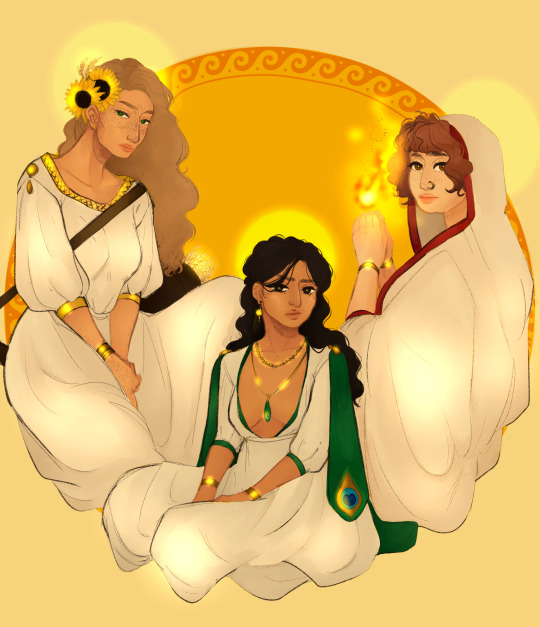
young goddesses // demeter, hera, hestia
389 notes
·
View notes